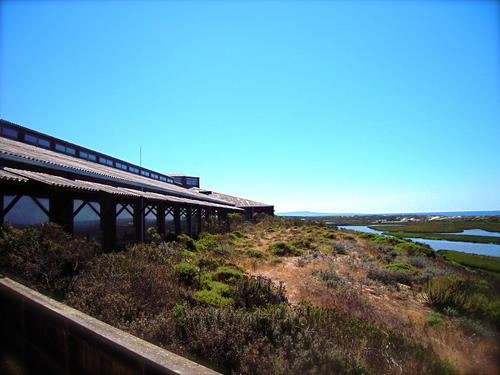Moss Landing Marine Laboratories (MLML) administers a Master of Science degree in marine science, which is supported and administered by SJSU. The academic program is available to students of the CSU consortium campuses, and is dedicated to excellence in both education and research. An outfitted marine operations department, active research diving program, and state of the art equipment and instrumentation allow for cutting edge research in a wide variety of disciplines including: marine ecology; the biology of marine plants, invertebrates, fishes, turtles, birds and mammals; oceanography and marine geology; chemistry and biogeochemistry. MLML's program is internationally-known for its hands-on, field-oriented approach that places our students, faculty, researchers and staff at the frontiers of marine science, where discoveries are being made worldwide.

MLML is situated in an excellent location for the study of the marine world. The Monterey Submarine Canyon, the largest such feature on the west coast of North America, begins within a few hundred meters of the Moss Landing harbor and the MLML research fleet. To the east of MLML is the Elkhorn Slough, the largest tract of tidal salt marsh in California outside of San Francisco Bay, and an important site for shorebirds, sea otters, and fishes. To the north and south are sand dunes, sandy beaches, and extensive kelp forest habitats along the rocky shoreline. Some of the most productive kelp forests and intertidal areas can be found in this region. MLML also is located between two large upwelling centers, which provide nutrients that not only stimulate an incredible amount of productivity but also provide a wealth of opportunities to study coastal oceanic processes.
MLML prepares students for careers in science, education and outreach, conversation, policy, and management, as well as the pursuit of doctoral degrees related to the marine sciences. More than 640 students have earned their M.S. degrees from MLML.
One quarter of our last 238 graduates have gone on to PhD programs, and nine have earned other additional degrees (e.g. DVM, JD, MBA).
One-quarter are employed by federal, state, and regional agencies (NOAA, NASA, NIH, ONR, EPA, USGS, CDFW, ADFG, ODFW).
One-sixth are employed by non-profits and NGOs (Elkhorn Slough, Monterey Bay Aquarium, Oikonos, The Marine Mammal Center).
One-eighth are employed at Universities, including eleven who hold academic positions.
PROGRAM LEARNING OBJECTIVES
1a. Demonstrate an understanding of fundamental concepts in a particular category of oceanography and marine science.
1b. Be able to synthesize and integrate across all of these fields, yet achieve a depth of understanding in the student’s individual specialty or field of study.
2. Demonstrate the ability to critically analyze scientific research, whether the student’s own research, or that performed by others.
3. Pose relevant scientific hypotheses or questions that may then serve to guide thesis research.
4. Demonstrate proficiency in the design and implementation of experiments or data collection methodologies to address specific hypotheses/questions..
5. Master the skills and tools of data collection and analysis (including analytical and statistical techniques as appropriate) specific to the student’s scientific field of study.
6. Demonstrate the ability to place one's own research within the larger context of relevant field of scientific study and to clearly identify the implications of this research for that field.
7. Demonstrate proficiency in oral and written communication by being able to present research clearly and concisely. This includes thoughtful and thorough oral and written presentation of their thesis and their responses to questions.
DEGREE REQUIREMENTS
• Completion of 30 units of coursework with a grade of 'B' or better, including:
• 3 of the following 5 core courses:
MS 103/203: Marine Ecology
MS 141/241: Geological Oceanography
MS 142/242: Physical Oceanography
MS 143/243: Chemical Oceanography
MS 144/244: Biological Oceanography
• A minimum of 15 200-level units, including:
MS 285: Graduate Seminar (2 units)
MS 299: Thesis (4 units)
• Submission of a committee-approved thesis.
• An oral thesis defense in the form of a seminar open to the general public.
-
MLML in action
Professor Ivano Aiello's MS 141: Geological Oceanography class on a field trip
-
MLML in action
MLML Ichthyology students conducting research in Alaska, pictured with a huge Yelloweye Rockfish
-
MLML in action
An MLML Geological Oceanography student extracts a water sample from a CTD onboard a NOAA CLIVAR Hydrography Cruise
-
MLML in action
MLML Chemical Oceanography students collecting microlayer samples offshore
-
MLML in action
MLML research faculty member Rick Starr and his student Jimmy serving on the science crew for the Old Bay Bridge demolition project in the San Francisco Bay
-
MLML in action
MLML students and crew onboard the R/V John Martin
-
MLML in action
MLML Ichthyology student diving with turtles
-
MLML in action
Professor Scott Hamilton's MS 113: Ichthyology class onboard the MLML R/V Point Sur
-
MLML in action
MLML students surveying Elasmobranchs in Elkhorn Slough for their thesis research
-
MLML in action
students, faculty, and staff enjoying the sunset on MLML's patio
-
MLML in action
Prof. Tom Connolly & student onboard the MS 142: Physical Oceanography class cruise
-
MLML in action
An MLML Invertebrate Zoology student gets an unexpected helper while diving for her thesis studying decorator crabs

